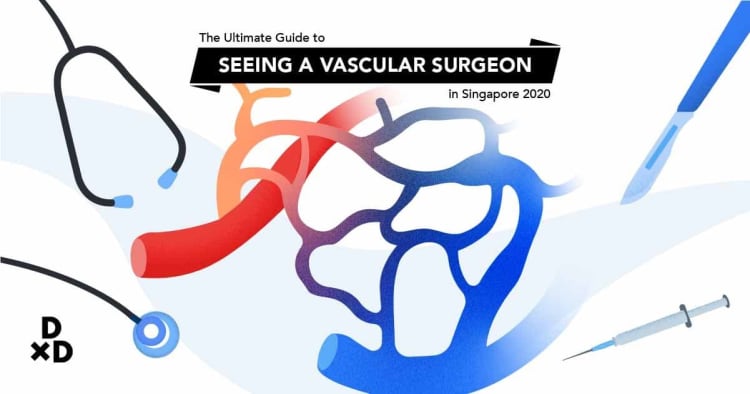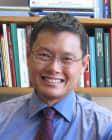You’ve been told you need to see a Vascular Surgeon for treatment in Singapore. What is a Vascular Surgeon? Is it a speciality in Singapore? This article will tell you what you need to know about seeing a Vascular Surgeon!
I also have an article on Deep Vein Thrombosis here on Human!
What is a Vascular Surgeon?
Vascular surgeons are specialists concerned with the treatment of symptoms or conditions concerning the vascular system, which you might know as the circulatory system [2].
The vascular system is made up of blood carrying vessels, such as the arteries and veins, which make up the blood circulatory system, as well as lymph vessels, which are part of the lymphatic system.
The lymphatic system consists of various tissues and organs which aid the body in the removal of waste and toxins.
They mainly serve to transport and circulate lymph, a substance comprising of white blood cells which fight infections, throughout the body.
One of the primary functions of the blood circulatory system is to transport oxygen and nutrient-rich blood throughout the body constantly. It is also in charge of removing carbon dioxide and other waste from the bloodstream.
Vascular surgeons are mainly concerned with the management and treatment of conditions of the veins and arteries of the body, except for the brain and heart.
How are Vascular Surgeons in Singapore trained?
An aspiring vascular surgeon first needs to complete medical school and finish residency. They then need to complete specialist training for five years in General surgery!
Despite its name, general surgeons are specialists who focus on abdominal medicine. This includes [1]:
- Oesophagus
- Stomach
- Small intestine
- Large intestine
- Liver
- Pancreas
- Gallbladder
- Appendix
- Bile ducts
They also deal with areas like
- Skin
- Breast
- Soft tissue
- Trauma
- Artery diseases, except within the heart and brain
- Hernias
And can perform gastroscopies and colonoscopies.
General surgery is divided into several disciplines, which include our area of interest, vascular surgery.
What are the differences between foreign vs locally trained surgeons in Singapore?
Recognised foreign and local vascular surgeons are trained in the latest medical research for vascular surgery.
The most significant difference you may find is that some surgeons approach you or explain medical concepts differently from others. However, this is true even among local surgeons.
What is the main difference between private and public vascular surgery in Singapore?
The main difference is that in public hospitals, you will be unable to pick which surgeon treats you.
You will need a reference letter from a polyclinic to see a vascular surgeon if you want subsidised treatment. You can choose to book an appointment without a referral letter, but you will be charged as a private patient.
You should make an appointment as early as possible as wait times vary. It can take a few weeks to a month or two before you see your surgeon!
Public and Private surgeons of other specialities treat other diseases like colorectal cancer.

Vascular emergencies will always be seen, even without an appointment or if it’s after hours. Some examples of emergencies include [3]:
- Aortic aneurysm
- Aortic dissection
- Arterial occlusion
- Subclavian steal syndrome
- Aortoenteric fistula
- Chronic mesenteric ischemia
- Mycotic aneurysm
Private clinics are more expensive but have a shorter wait time. You don’t need a referral letter and can book appointments 1-2 days beforehand. Most clinics accept walk-in patients too.
Where can I find Vascular Surgeons in Singapore?
You can find vascular surgeons in both private and public hospitals. Some vascular surgeons have also set up their clinic around Singapore.
Note that vascular surgery sometimes falls under the speciality ‘General Surgery’. The public hospitals that can handle vascular issues include:
- Singapore General Hospital, which holds a department of vascular surgery.
- Sengkang General Hospital, which has a Vascular and Endovascular Service.
The private hospitals that you can go to include:
What is the cost of a Vascular Surgery in Singapore?
Non-elective emergency treatments are expensive and can cost $50,000 or more because of ward and overtime fees.
Treatment fees are not readily available, except varicose veins below [4].
Treatment
Public Hospital, subsidised costs
(depending on whether it’s ward C or B2)
Public Hospital, unsubsidised costs
(depending on whether it’s ward B1 or A)
Private hospital costs
Varicose/Spider Veins (Surgery)
$1655-$1732
Not published
$11,000-$13,000
Operation Fee:
$10,000-$13,000Implant Fee:
NAOther Fee:
$200-$620
Can Medisave for a Vascular Surgery in Singapore?
You can claim different amounts of Medisave for various treatments. Not all private institutions allow you to claim Medisave. Check whether the clinic you’re going to is approved on the government website.
Treatment
Maximum amount claimable
Varicose/Spider Veins
$1550 for 1 leg
$2150 for 2 legs

How long will it take before I can return to work?
You will probably need to rest at home for about 2-3 months before you can go back to work after surgery. You should also try to avoid manual work if you can.
An exception is Varicose/Spider vein treatment. Most people can go back to work after a week of rest at home. However, for more extensive surgeries, you may require a few more weeks.
Conclusion
Vascular surgery can sound scary, but you have several options on where to find a specialist in Singapore. Rest assured that the surgeon that treats you will have met rigorous standards to get to where they are today!
Dr Cheng Shin Chuen is a General Surgeon with a sub-speciality in Vascular and Endovascular procedures. He is the clinical director at Cheng SC Vein & Endovascular Clinic.
Dr Cheng was the Chief of Vascular and Endovascular Surgery Services at Tan Tock Sent Hospital. He was also the Associate Program Director of General Surgery Training, NHG-AHPL Training Cluster and Adjunct Assistant Professor, National University of Singapore. In 2011, he was awarded the inaugural Nanyang Technological University-National Healthcare Group for Vascular Imaging research.









